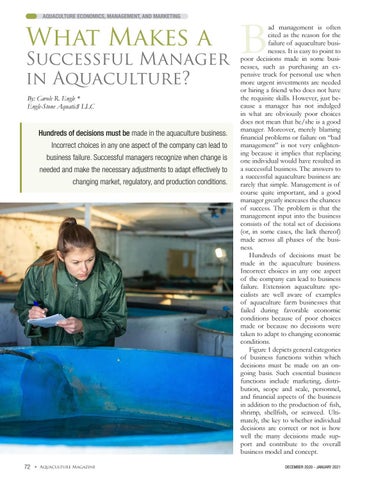AQUACULTURE ECONOMICS, MANAGEMENT, AND MARKETING
What Makes a
Successful Manager in Aquaculture? By: Carole R. Engle * Engle-Stone Aquatic$ LLC
Hundreds of decisions must be made in the aquaculture business. Incorrect choices in any one aspect of the company can lead to business failure. Successful managers recognize when change is needed and make the necessary adjustments to adapt effectively to changing market, regulatory, and production conditions.
72 »
B
ad management is often cited as the reason for the failure of aquaculture businesses. It is easy to point to poor decisions made in some businesses, such as purchasing an expensive truck for personal use when more urgent investments are needed or hiring a friend who does not have the requisite skills. However, just because a manager has not indulged in what are obviously poor choices does not mean that he/she is a good manager. Moreover, merely blaming financial problems or failure on “bad management” is not very enlightening because it implies that replacing one individual would have resulted in a successful business. The answers to a successful aquaculture business are rarely that simple. Management is of course quite important, and a good manager greatly increases the chances of success. The problem is that the management input into the business consists of the total set of decisions (or, in some cases, the lack thereof) made across all phases of the business. Hundreds of decisions must be made in the aquaculture business. Incorrect choices in any one aspect of the company can lead to business failure. Extension aquaculture specialists are well aware of examples of aquaculture farm businesses that failed during favorable economic conditions because of poor choices made or because no decisions were taken to adapt to changing economic conditions. Figure 1 depicts general categories of business functions within which decisions must be made on an ongoing basis. Such essential business functions include marketing, distribution, scope and scale, personnel, and financial aspects of the business in addition to the production of fish, shrimp, shellfish, or seaweed. Ultimately, the key to whether individual decisions are correct or not is how well the many decisions made support and contribute to the overall business model and concept. DECEMBER 2020 - JANUARY 2021









